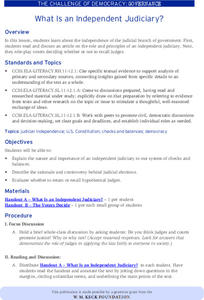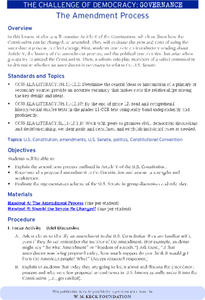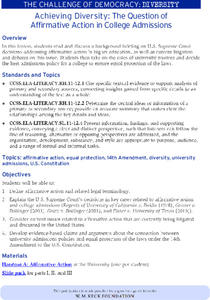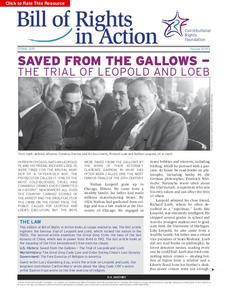Constitutional Rights Foundation
Why Don’t More People in the U.S. Vote?
To vote or not to vote, that is the question. Secondary scholars explore voter turnout in the United States. The resource uses informational text, group discussion, and a worksheet to help academics understand hindrances to voting...
Constitutional Rights Foundation
Suppressing the Vote
Voting rights have expanded over time, but some voters are still being suppressed. A thought-provoking resource explores the history of voter suppression in the US and efforts to remove roadblocks to voting. Young historians learn about...
Constitutional Rights Foundation
Purged From the Voter Rolls: Husted v. A. Philip Randolph Institute
Once a registered voter isn't always a registered voter. Academics explore the topic of voter registration and hindrances to remaining registered. The resource focuses on data analysis, federal voter registration law, and Supreme Court...
Constitutional Rights Foundation
Slavery and the Electoral College
How did slavery mold the creation of the US Constitution? The final lesson plan in the series focuses on how slavery impacted the creation of the Electoral College. Academics learn how the Electoral College was created because Southern...
Constitutional Rights Foundation
270 Votes to Win: The Electoral College in the United States
What exactly is the Electoral College and how does it work? The lesson is part of a larger series on government that explains what the Electoral College is and how it helps determine an election winner. Academics participate in...
Constitutional Rights Foundation
Why We Have Freedom of the Press
A newspaper receives documents that reveal not only a devastating secret the public needs to know, but also troop movements that could put American lives at risk: to publish or not to publish? Using background readings, discussion...
Constitutional Rights Foundation
Prayer and Friday Night Lights? An Establishment Clause Case from Texas
Is a Christian prayer before a Friday night football game a nice gesture or the imposition of religion on the rest of the community? A resource asks the question using a clip from the popular movie "Friday Night Lights" and readings...
Constitutional Rights Foundation
What Is an Independent Judiciary?
While justice is supposed to be blind, it doesn't always follow the rules. Using a reading on the independent judiciary and case studies, learners consider what to do with judges who rule in their own self-interest rather than on behalf...
Constitutional Rights Foundation
The Role of the Judiciary
The role of the judicial branch has far reaches into American life. Learners consider its uses with a reading on the branch and a structured conversation on the topic. Together, they work to root their contributions to the discussion in...
Constitutional Rights Foundation
Is Democracy in Decline?
Has democracy outlived its usefulness? Pundits debate the topic, and now pupils weigh in, too. A reading on how democracy may be on the decline around the world, along with a structured conversation guideline, help guide scholars through...
Constitutional Rights Foundation
The Amendment Process
Long revered as the "upper chamber," the US Senate was created to give the new nation a balance between large and small states. However, has the time for this institution passed? Using a reading on how the amendment process works,...
Constitutional Rights Foundation
The Census in US History
The census has been a part of the American landscape since the Constitution was written; however, it does have a history of controversy. Class members use a guided reading and simulation activity on developing census questions to...
Constitutional Rights Foundation
Achieving Diversity: The Question of Affirmative Action in College Admissions
How can a college board of trustees both increase cultural and racial diversity and offer all incoming students equal protection under the Fourteenth Amendment? Class members debate the question using readings about how colleges use...
Constitutional Rights Foundation
The Debate Over Gun Laws in the United States – An Introduction
Gun control is one of the most hotly debated topics in the United States. Learners use a structured conversation to engage around this controversy. Using a scaffolded conversation that relies on a reading and analysis of arguments for...
Constitutional Rights Foundation
Understanding Fake News
Fake or fact? Learners must decide while looking at two published "news" stories. A reading about why fake news exists and a checklist on how to evaluate sources rounds out the activity.
Constitutional Rights Foundation
Criminal Justice in America
The allure of true crime television shows often leads to intrigue of the criminal justice system. Using a six-unit curriculum, learners explore criminology and the justice system in the United States. Topics include the police, trial...
Constitutional Rights Foundation
The Declaration of Independence
Your class can write a PSA about the Declaration of Independence! They write public service announcements and present them to the class. They also engage in reading and discussion activities to further understand a challenging—yet...
Constitutional Rights Foundation
Puritan Massachusetts: Theocracy or Democracy?
Was Puritan society governed as more of a theocracy or democracy? After comparing and contrasting a series of primary source documents, middle and high schoolers form small groups and debate the question.
Constitutional Rights Foundation
Saved from the Gallows — the Trial of Leopold and Loeb
Was justice served for Bobby Franks? An informative article about the 1924 trial of Richard Loeb and Nathan Leopold includes an overview of the murder of Bobby Franks, the defense’s legal strategy, and excerpts of closing arguments from...
Constitutional Rights Foundation
The Election of 1912
The Election of 1912: an election with four competitive opponents. Pupils get to know the candidates with informative reading passages that provide context to the election. Then, the class engages in a debate and answers questions as one...
Constitutional Rights Foundation
The Cold War: How Did It Start? How Did It End?
What is the difference between a Cold War and a Hot War? Scholars research the beginning of the Cold War. They analyze diary entries as well as excerpts from various events during the 45-year standoff. To finish, they prepare final...
Constitutional Rights Foundation
Rachel Carson and the Modern Environmental Movement
Scholars analyze the environmental movement started in the 1960s. Through excerpts from Rachel Carson's books as well as diary entries, they take a look at the reason for the modern movement to save the planet and then create final...
Constitutional Rights Foundation
Conservation, Preservation, and the National Parks
Going green? Scholars investigate the creation of the US National Park program. Through diary entries as well as expert testimony, they synthesize information and analyze the need for conservation and preservation. Finally, they display...
Constitutional Rights Foundation
Women in the Military
Scholars analyze the role of women in the military in United States history. Using group research, debate, and diary entries, they explore various military activity in America. To complete the lesson, young historians write an essay...

























